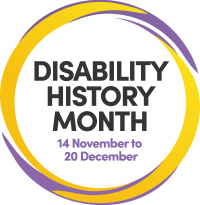
14 November – 20 December
Join us as we celebrate and learn.

Lottie James, VP Welfare & Community
Disability History Month is here, and this year’s theme focuses on livelihood and employment. As your Vice President of Welfare and Community, I’m committed to ensuring our disabled students have a voice, feel represented, and have equal access to quality education and opportunities. This means supporting disabled students academically, in extracurriculars and career preparation. This includes bringing inclusive employers to Careers Fairs, equipping club and society committees to create inclusive spaces, and providing career workshops tailored to disabled students’ needs.
The History
Understanding the progress in disability rights in the UK and globally is key to building allyship and empowering disabled people to advocate for themselves. Though much has been achieved, there is still work to do to create a truly inclusive and accessible world.
In the 1970s, the Union of the Physically Impaired Against Segregation (UPIAS) highlighted that barriers in society—not disabilities themselves—create challenges for disabled people, a perspective known as the social model of disability.
Less than thirty years ago, in 1995, the Disability Discrimination Act (DDA) prohibited discrimination in employment, education, and beyond, requiring universities and employers to make reasonable adjustments. Later amendments introduced the Disability Equality Duty, mandating universities and employers to consider disabled people’s needs in policy-making. Five years later, the Equality Act 2010 strengthened protections, combining all anti-discrimination laws and reinforcing rights against harassment and discrimination.
It is important that you are aware of your rights as a disabled person. The Advice Centre offers free, confidential advice, and the University’s Student Hub can discuss adjustments for your studies. The Careers team provides workshops and one-on-one advising on rights in the workplace. If you have faced discrimination due to your disability or any protected characteristic, please use the Report and Support tool to gain access to support and discuss the next steps.
Reasonable Adjustments
A difficult part of working and studying for me was knowing what reasonable adjustments were and what I could ask for. Employers often leave it up to you, which can be tricky if you struggle with self-advocacy. Here are some adjustments I’ve used in study and work settings that might help:
- An occupational health therapist or a Student Hub advisor can make recommendations for adjustments and ensure they are carried out.
- Flexible work environments can mean adjusting your working hours, working remotely, extending deadlines, or receiving extra time for exams.
- Screen readers, recording lectures, and speech-to-text software may be helpful.
- I have a buddy at SUSU who helps me with notes, admin tasks and processing information.
- If you’re sensitive to noise, request a quiet space where you can work to concentrate.
- I have requested that my communication be written over verbal, which helps me process information. I ask if I can record and take notes if I need to meet in person.
I recommend joining the Neurodiversity and Disability Society or attending monthly meetings of the Disabled Students’ Network, where SUSU and University staff gather to address concerns. If you need further support, email me on welfare@soton.ac.uk.